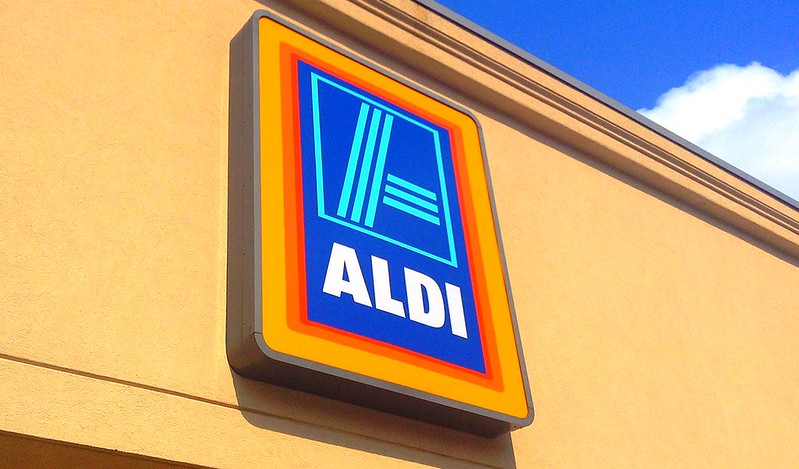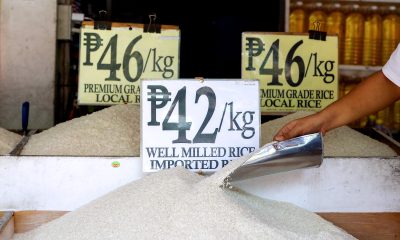Business and Economy
Canada’s shopping for a foreign grocer. Can an international retailer succeed here?

CBC News reached out to Aldi to ask whether it has plans to come to Canada but didn’t receive a response. (File Photo: Mike Mozart/Flickr, CC BY 2.0)
An international supermarket could spur competition, analysts say, if one is willing to come here at all
With some Canadians struggling to afford groceries (new window), and as frustrations with corporate profits boil over (new window) and manifest as boycotts, the federal government says it’s trying to coax international grocers to set up shop in Canada.
During a Tuesday media conference, Industry Minister François-Philippe Champagne told reporters that he continues to look at whether there are foreign deep-discounters that would be interested in the Canadian market.
The minister has been open about his plans for months, and the Wall Street Journal first reported last month that he was courting a dozen European and U.S. companies, including German chains Aldi and Lidl, and U.S. chain Grocery Outlet Holding.
Yet grocery industry analysts in Canada say dangling a carrot in front of an international supermarket brand won’t solve the consolidation problem — if there’s a carrot to dangle at all.
Giving Canada’s grocery giants a run for their money would require massive operational scale and investment in the country’s market, said Kevin Grier, a livestock, meat and grocery market analyst based in Guelph, Ont.
And for what? For what return? I’m sure they’re wondering what the return would be,
said Grier of the foreign grocers on Champagne’s list. I don’t think there’s a lot of, you could say, excess to be garnered [in the Canadian market].
When the Competition Bureau released a wide-ranging report in June 2023 that assessed (new window) the state of the Canadian grocery industry, it concluded that more competition was needed to bring prices down — and that the entry of a foreign grocer could help.
Listen, are we going to succeed? I don’t know,
Champagne said. Is it worth the effort? Definitely. We’re going to keep on pushing.
Scale of Canadian market poses challenges
According to a July 2023 report (new window) by the U.S. Department of Agriculture, the Canadian grocery industry was dominated in 2021-2022 by five chains that held nearly 74 per cent of the retail market share: Loblaw, Metro, Sobeys, Walmart and Costco.
Jordan LeBel, a food marketing professor at Concordia University’s John Molson School of Business in Montreal, said there’s good reason to introduce more competition into a heavily consolidated market.
Competition tends to bring more innovative products to market,
he said, noting it’s also more likely to result in affordable prices and generally provide better all around experiences for customers.
But a foreign grocer up for the challenge might face other barriers on the way in, he said, calling the government’s push to find one merely lip service.
Looking at Canada, it’s a huge territory. It’s a vast land. You have to concentrate your operations around key cities. Is that enough to justify an international expansion?
LeBel said, noting that it would be costly to set up a supply chain across the country.
WATCH | Customers say Loblaw inconsistent on 50 per cent discounts:
CUSTOMERS ANGRY ONLY SOME LOBLAW-OWNED STORES OFFER 50% DISCOUNTS
Although Loblaw has now reinstated its popular 50 per cent discounts on perishable food at stores that offered it before, some customers say they want to see it at all Loblaw-owned stores.
Some Canadian independent grocers have criticized major domestic grocery chains for the power they have over suppliers, including charging them fees (new window) for things like shelf placement or packaging. That’s one of the practices that the proposed Grocery Code of Conduct will try to restrict.
LeBel noted that many of the major brands have loyalty programs (new window) that might make customers reluctant to switch grocers.
Canada’s biggest grocery companies also have established relationships with suppliers that allow them to pay less for bulk orders. Forging those types of relationships with suppliers could be challenging for new players.
If they’re not large scale right away, they’re going to pay more for their beef. They’re going to pay more for the Heinz Ketchup,
said Grier.
Aldi growing fast in U.S.
German deep-discounter Aldi is among the brands reportedly on Champagne’s list. While already established across European markets, it’s among the fastest growing (new window) grocers in the U.S.
Aldi is popular in the minds of many Canadians because it has always positioned itself as an affordable grocery shopping destination,
said LeBel.
The company sells mostly private label brands and its own items, including pre-packaged foods. Its stores are small, and it keeps a limited selection of products compared to other supermarkets.
As one market analyst told the New York Times (new window) in 2011, just as Aldi was expanding its U.S. footprint: It simplifies everything — supply chain, delivery … You stock the stuff that’s the highest velocity and that you make the highest margin on.
CBC News reached out to Aldi to ask whether it has plans to come to Canada but didn’t receive a response. A spokesperson for Grocery Outlet Holdings, the lone U.S. grocer on Champagne’s list, told CBC News that there were no imminent plans to expand to Canada.
There are lessons to be learned from Canada’s past dealings with international chains.
Safeway Canada, the subsidiary of a California-based food chain and a mainstay in the Western provinces, was bought by Sobeys in a $5.8 billion deal in 2013. The Canadian takeover led to (new window) diminishing returns and the exit of the CEO.
General merchandiser Target, which came here in 2013, left Canada with their tail between their legs,
said Grier, the market analyst. Target Canada, where groceries were supplied by Sobeys, closed all its stores here in 2015, struggling to operate at the necessary scale and having to fight the perception (new window) that it was pricier than its competitors.
Lessons learned by Walmart
Among those competitors was Walmart, now one of the largest grocery retailers in Canada. The U.S. retail giant learned valuable lessons in its domestic operations that it then carried into Canada, Grier noted.
The company uses a specific kind of data technology called a blockchain (new window) to help simplify its operations — everything from tracking deliveries to automating payments.
The ability to put low-priced items in front of the consumer, that’s what they want to be known as,
said Grier of Walmart.
Twenty-five per cent of Canadians surveyed for the Competition Bureau’s June report said they usually shopped at Walmart.
Others shopped at Loblaw-owned stores (49 per cent), many bought from Sobey-owned stores (28 per cent), 22 per cent shopped at Metro-owned stores and 18 per cent shopped at Costco.
Twenty-eight per cent of those respondents said that they usually shopped at other grocery stores.
Accessibility remains an issue
For Canada’s 6,400 independent grocers, many of which operate in communities where big supermarkets don’t have a presence, the government’s efforts to woo an international chain are a bitter pill to swallow.
We’d like them to sit down and talk about our list instead of trotting off to France or somewhere else in Europe to dangle some bells and whistles in front of some big chain,
said Gary Sands, senior vice-president of the Canadian Federation of Independent Grocers (CFIG).
He noted that there has been some progress in areas of concern to independent grocers, including a bill passed in December that limits (new window) the use of property controls, a type of lease clause that can restrict a new grocer from moving into a competitor’s old retail space.
Accessibility is a substantial part of the problem. Some Canadian cities have what’s known as “food deserts (new window),” areas that have limited access to fresh and healthy food due to a lack of grocery stores.
WATCH | These volunteers are tackling food insecurity in Nova Scotia:
HOW THESE VOLUNTEER GROUPS ARE STEPPING UP TO TACKLE FOOD INSECURITY IN N.S.
With grocery prices skyrocketing over the past few years, more people are looking for help to stock their pantries. Across Nova Scotia, volunteer-run groups are stepping up — and some just got a boost in funding to help them meet demand. Taryn Grant has that story.
For those who don’t have a car, getting to a grocery store that’s further than 15 minutes away might be logistically impossible — and they might have limited options.
The Competition Bureau found that almost a quarter of Canadians have only one or two grocery stores within 15 minutes of their home (based on how they usually get to a grocery store).
Of course, you’re not going to be able overnight to build thousands of points of sales to compete against the giant top three supermarket chains,
said LeBel.
We still have food deserts in this country, and that’s unacceptable,
he said.
It’s not just a question of bringing in outside people to create additional competition. It is setting up the conditions that will favour innovation in production and distribution and retailing.
Jenna Benchetrit (new window) · CBC News ·
This article is republished from RCI.





















